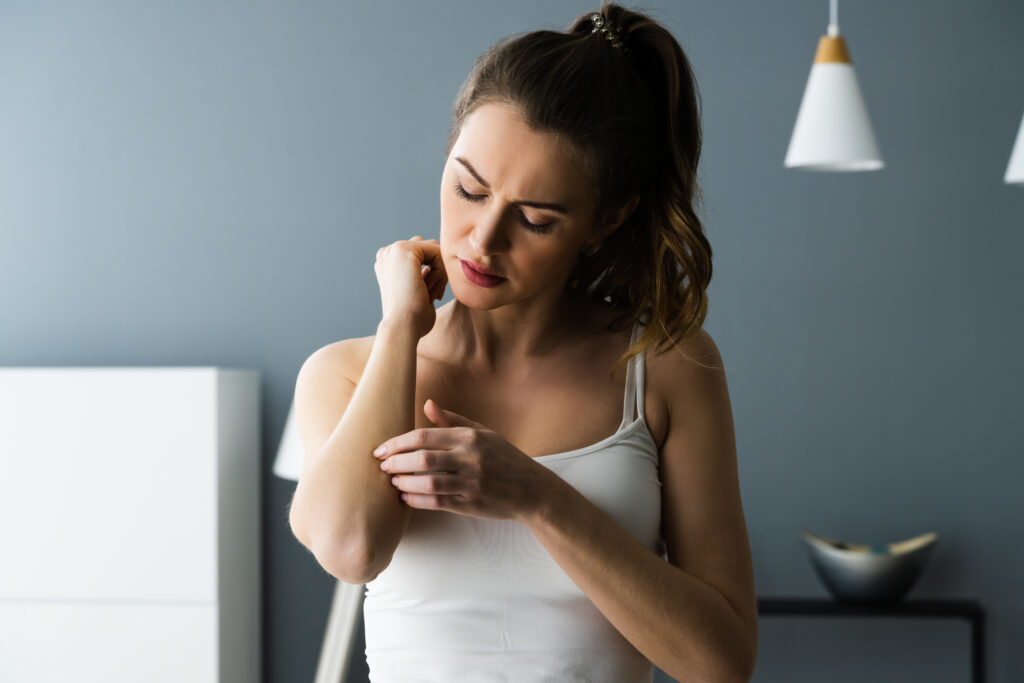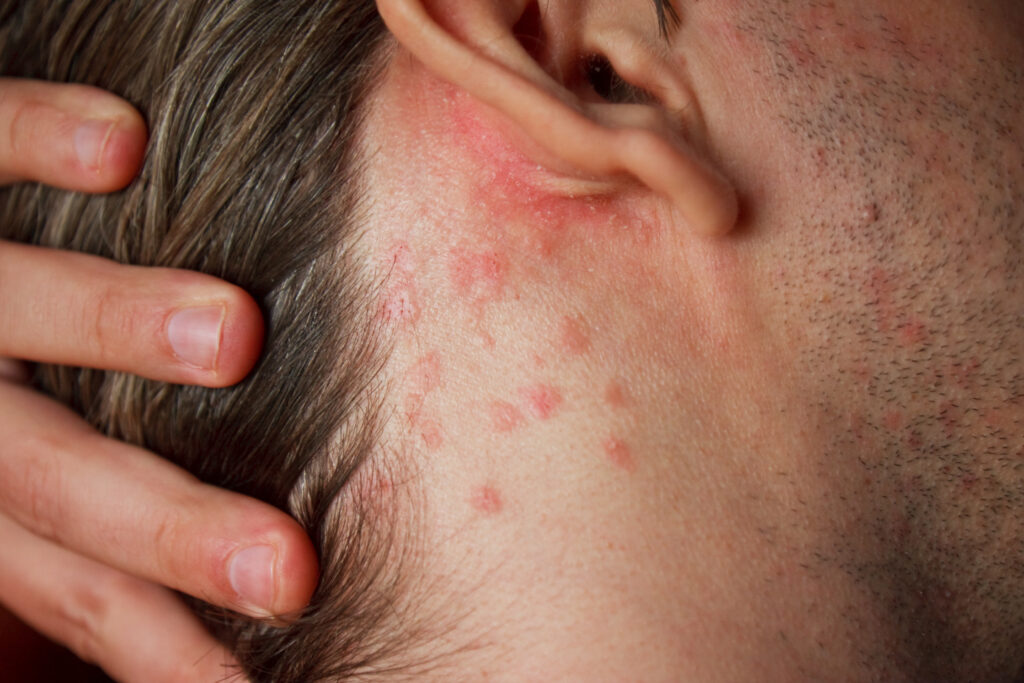Psoriasis
Psoriasis is a skin condition that affects around 2 in every 100 people.
Recognisable by red, itchy, and scaly patches on the skin, psoriasis most commonly affects the knees, elbows, trunk, and scalp.
Unfortunately, psoriasis doesn’t have a cure. However, symptoms and flareups can be managed with effective treatment. Whether you are trying to find out if you have psoriasis or you are looking for more information on how to live with this common condition, you will find everything you need to know here.
Read on to discover
- What is psoriasis?
- What are the main symptoms of psoriasis?
- What areas of the body can be affected by psoriasis?
- What are the different types of psoriasis?
- What causes psoriasis?
- How to diagnose psoriasis?
- Can psoriasis cause complications?
- When to see your doctor about psoriasis?
- What are the best psoriasis treatments?
- How to live with psoriasis?
- Psoriasis FAQs
What is psoriasis?
Psoriasis is a common skin condition that can affect many areas of the body, including the knees, elbows, trunk, and scalp.
It is a long-term and chronic condition that does not have a cure. However, the symptoms of psoriasis can be effectively managed with the right treatment and lifestyle changes. If you have psoriasis, you are likely to go through cycles where your symptoms flare up and then subside or go into remission.
What are the main symptoms of psoriasis?
Symptoms vary between people, but the main symptoms of psoriasis are:
- Red patches on the skin that are covered in thick, silvery scales
- Dry, cracked skin that may itch or bleed
- Burning or soreness of the skin
- Thickened, pitted, or ridged finger and toenails
- Swollen and stiff joints
- Small spots of scaling are also common in children with psoriasis.
If you have particularly bad psoriasis or severe psoriasis, you may have all the above symptoms over large areas of your body.

What areas of the body can be affected by psoriasis?
Psoriasis can affect many different parts of the body. Some people only develop psoriasis in one area, while others experience multiple areas of irritation.
Some of the most common parts of the body affected by psoriasis are:
- Scalp psoriasis
- Psoriasis elbow
- Psoriasis on knees
Other areas of the body include:
- Psoriasis on face
- Psoriasis on lips
- Psoriasis on hands
- Psoriasis on feet
- Psoriasis on legs
- Psoriasis on eyelid
- Psoriasis in ears
- Toenail psoriasis
- Psoriasis fingernails
- Psoriasis on neck
- Psoriasis genital
What are the different types of psoriasis?
The different types of psoriasis, include:
Plaque psoriasis
This is the most common type of psoriasis. It causes dry, raised, red patches on the skin that are covered in silvery scales.
These are often itchy and tender. Some people have a few patches, and others have many. Plaque psoriasis affects the elbows, knees, lower back, and scalp.
Nail psoriasis
Nail psoriasis, as the name suggests, affects the fingernail and toenails. This type of psoriasis causes nail pitting, abnormal nail growth, and discolouration of the nails.
In severe cases of nail psoriasis, the nail may come off the nail bed entirely, or the nail may crumble.
Guttate psoriasis
Guttate psoriasis is most common in children and adolescents. It is usually triggered by a bacterial infection such as strep throat.
The most common symptoms of guttate psoriasis are small, drop-shaped lesions on the arms, legs, and trunk.
Inverse psoriasis
This type of psoriasis usually affects the groin, buttocks, and under the breast. You can recognise inverse psoriasis by smooth patches of red skin that get worse when you sweat.
Inverse psoriasis is typically caused by a fungal infection.
Pustular psoriasis
This is a rarer type of psoriasis that manifests itself as pus-filled lesions that tend to occur on the palms of the hands and the soles of the feet.
Erythrodermic psoriasis
This type of psoriasis is the least common one, but it can cover the entire body. Erythrodermic psoriasis is displayed as a red, peeling rash that often itches or burns.
Psoriatic arthritis
Psoriatic arthritis is a type of arthritis that is linked to psoriasis. This condition is similar to rheumatoid arthritis, but it tends to affect fewer joints.
Some of the early signs of psoriatic arthritis are joint pain stiffness, pitted nails, nail separation, back pain, and swollen fingers or toes.
What causes psoriasis?
Although medical professionals are not 100% sure what causes psoriasis, it is thought to be caused by a problem with the immune system.
In people without psoriasis, the body produces new skin cells in the deepest layer of the skin. These new skin cells then gradually move up the layers of the skin until they reach the surface where they die and flake off. This process takes between 3-4 weeks.
However, in people who have psoriasis, this entire process only takes between 3-7 days. This means that the new skin cells cannot mature enough, which results in flaky and crusty patches on the skin.
For people predisposed to psoriasis, there are certain psoriasis triggers such as:
- Infections. Strep throat and other skin infections can cause psoriasis to flare up.
- Weather. Cold and dry conditions can make you more likely to experience psoriasis.
- Skin injuries. Insect bites, cuts or scrapes to the skin, or sunburn.
- Stress. High levels of stress can wreak havoc with your immune system and make psoriasis more likely to occur.
- Smoking. Smoking and secondhand smoke exposure can irritate the skin and trigger psoriasis.
- Alcohol consumption. Heavy drinking or binge drinking can cause problems with the skin, including psoriasis.
- Certain medications. Medications such as lithium, high blood pressure tablets, and antimalarial drugs can trigger psoriasis.
If you have a family history of psoriasis, you are more likely to suffer from the condition yourself. If one of your parents has psoriasis, you are more at risk. If both your parents have psoriasis, you have an even greater risk.

How to diagnose psoriasis?
Book an appointment with your dermatologist or doctor if you are not sure if you have psoriasis or another common skin condition.
During your appointment, your doctor will ask you questions about your overall health and examine your skin. Your GP may take a skin biopsy so that they can examine it under a microscope. This will help to determine what type of psoriasis you have and the right treatment needed.
There are currently no self-test kits for psoriasis. However, most people can self-diagnose based on their symptoms.
Can psoriasis cause complications?
In most cases, psoriasis is uncomfortable but harmless. It does increase your risk of developing other conditions such as:
- Psoriatic arthritis
- Conjunctivitis, blepharitis, and uveitis
- Obesity
- Type 2 diabetes
- High blood pressure
- Cardiovascular disease
- Psoriasis autoimmune disease such as coeliac disease, sclerosis, and Crohn’s disease
- Mental health issues such as anxiety, depression, and low self-esteem
When to see your doctor about psoriasis?
In many cases, psoriasis can be treated with over-the-counter remedies such as creams and ointments. However, if your psoriasis is detrimental to your physical or mental health, make an appointment with your GP.
If you are not sure if you have psoriasis or another skin condition or you have any of the following severe psoriasis symptoms, then it is also a good idea to contact your GP:
- Your psoriasis spreads
- Your psoriasis becomes painful
- You are concerned about your skin’s appearance
- You are also experiencing joint problems such as swelling
- Over-the-counter treatments are proving ineffective

What are the best products for psoriasis?
There is no cure for psoriasis. However, there are treatments to help manage your symptoms and give you a better quality of life.
The treatment that you need will be dependent on how severe your psoriasis is and where on your body you have it.
Systemic medications
People who suffer from severe psoriasis who have not seen an improvement in their skin with other treatments such as creams may be advised to start taking either oral or injected medications. Methotrexate, Ciclosporin, and Acitretin are the most common systemic medications used to treat psoriasis.
Each individual case of psoriasis is different, which means that each treatment plan needs to fit your specific needs and symptoms. For optimum results, review your treatment plan with your GP regularly and make sure that you remain vigilant in your symptoms so that you know what works and what doesn’t.
Phototherapy
Phototherapy is a type of treatment for psoriasis that involves exposing the skin to certain types of UV light. Two types of ultraviolet light are used to treat psoriasis: narrowband UVB and PUVSA.
A recommended course of these treatments is typically between 5-10 weeks, depending on which type of ultraviolet light is applied.
Topical creams and emollients
Emollients to soften the skin such as Locobase Repair or Locobase Protect.
Other psoriasis treatments include
- Calcineurin inhibitors
- Topical steroids
- Cold tar preparations
- Dithranol preparations
How to live with psoriasis?
It can be challenging living with psoriasis, but there are steps that you can take to keep yourself in a positive mindset and to reduce your symptoms.
Some of the most effective coping mechanisms for living with psoriasis include
Seek support
You don’t have to live with psoriasis on your own. There are many other people who are going through the same experiences and struggles as you, and they can help to support you.
If you have a dermatologist, it can be a good idea to ask them about local support groups in your area. Alternatively, you could contact a charity such as The Psoriasis Association.
Get involved
Another highly effective way to deal with both the physical and mental effects of psoriasis is to get involved in a national or local charity.
You could become a mentor or an ambassador. Either way, this can help you take control of your condition and stay proactive in your approach to treatments and a good quality of life.
Practice self-care
Aside from the mental benefits of self-care, there are also many ways that self-care can help to improve your condition.
To manage your symptoms and reduce episodes, you should:
- Eat a nutritionally balanced diet
- Get the recommended 7-8 hours of sleep per night
- Partake in regular exercise
- Take steps to reduce your stress levels
- Talk to family and friends
- Focus on gratitude
Psoriasis FAQs
What is the main cause of psoriasis?
There is no definitive cause of psoriasis, but doctors believe it to be a combination of genetics and the immune system. It is an autoimmune condition which means that it occurs due to the body attacking itself.
What causes psoriasis later in life?
Psoriasis in later life, often referred to as late-onset psoriasis, is caused by a combination of factors, including stress, skin injuries, past infections, and certain medications such as beta-blockers.
What foods contribute to psoriasis?
Foods that can cause your psoriasis to flare include junk food, processed food, red meat, dairy products, and citrus fruits. Alcohol can also exacerbate the symptoms of psoriasis and make episodes more frequent.
Is psoriasis caused by stress?
Stress can trigger psoriasis, and it can also make your symptoms worse. You can meditate, practice breathing techniques and take regular exercise to reduce your stress levels which could improve your psoriasis.
How long can psoriasis last?
Psoriasis is an unpredictable skin condition that can flare at any time. However, it can also lay dormant for long periods. To reduce the length of psoriasis episodes, seek the appropriate treatment as soon as you notice any symptoms.
Is psoriasis contagious?
No, psoriasis is not contagious. This means that it cannot be passed from one person to another via skin-to-skin contact.
No products found